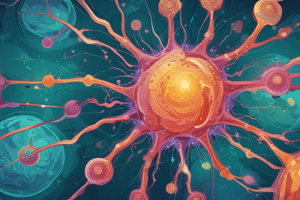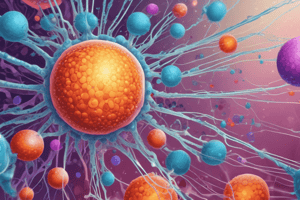Podcast
Questions and Answers
What is the minimum number of antigen molecules required to bind to adjacent membrane Ig molecules to induce signaling in B cells?
What is the minimum number of antigen molecules required to bind to adjacent membrane Ig molecules to induce signaling in B cells?
- 3 or more
- 4 or more
- 1
- 2 or more (correct)
What is the result of tyrosine phosphorylation of ITAMs in Igα and Igβ?
What is the result of tyrosine phosphorylation of ITAMs in Igα and Igβ?
- Recruitment and activation of molecules, mainly enzymes (correct)
- Degradation of B cell receptors
- Inhibition of signaling cascades
- Inhibition of transcription factors
What is the consequence of B cell activation by antigens on B cell interaction with helper T lymphocytes?
What is the consequence of B cell activation by antigens on B cell interaction with helper T lymphocytes?
- Induces apoptosis of B cells
- Prepares B cells to interact with helper T lymphocytes (correct)
- Prevents interaction with helper T lymphocytes
- Activates cytotoxic T cells
What is the outcome of Ig-mediated B cell activation on B cell proliferation?
What is the outcome of Ig-mediated B cell activation on B cell proliferation?
What is the consequence of B cell activation on IgM synthesis?
What is the consequence of B cell activation on IgM synthesis?
What is the cellular component involved in the transduction of signals in B cells?
What is the cellular component involved in the transduction of signals in B cells?
What is the main function of class II MHC molecules in B lymphocytes?
What is the main function of class II MHC molecules in B lymphocytes?
Which chemokine receptor is most likely to be decreased in follicular helper T cells?
Which chemokine receptor is most likely to be decreased in follicular helper T cells?
What is the role of CD40 ligand (CD40L) in the interaction between helper T cells and B lymphocytes?
What is the role of CD40 ligand (CD40L) in the interaction between helper T cells and B lymphocytes?
What is a consequence of B cell proliferation induced by helper T cells?
What is a consequence of B cell proliferation induced by helper T cells?
Which of the following is a critical step in the mechanisms of helper T cell-mediated B lymphocyte activation?
Which of the following is a critical step in the mechanisms of helper T cell-mediated B lymphocyte activation?
How do cytokines affect B cell cytokine receptors in helper T cell-mediated B lymphocyte activation?
How do cytokines affect B cell cytokine receptors in helper T cell-mediated B lymphocyte activation?
What is a key characteristic of antigens that induce the early phase of humoral immune response?
What is a key characteristic of antigens that induce the early phase of humoral immune response?
Which of the following is NOT a step in the process of B lymphocytes preparing for interaction with helper T cells?
Which of the following is NOT a step in the process of B lymphocytes preparing for interaction with helper T cells?
What is a functional consequence of Ig-mediated B cell activation?
What is a functional consequence of Ig-mediated B cell activation?
What initiates the process of B cell proliferation and IgM secretion?
What initiates the process of B cell proliferation and IgM secretion?
Which statement best describes the helper T cell dependent antibody response?
Which statement best describes the helper T cell dependent antibody response?
What is a consequence of increasing the expression of receptors for chemokines produced in lymphoid follicles?
What is a consequence of increasing the expression of receptors for chemokines produced in lymphoid follicles?
Flashcards are hidden until you start studying
Study Notes
B Cell Proliferation and Differentiation
- Antigen receptor-mediated signal transduction in B cells occurs when antigens induce clustering of membrane Ig receptors, triggering signals that activate B lymphocytes.
- Cross-linking of membrane Ig receptors is required, which involves 2 or more antigen molecules or repeating epitopes of an antigen molecule binding to adjacent membrane Ig molecules of a B cell.
Antigen Receptor-Mediated Signal Transduction
- The B cell receptor complex (BCR) consists of membrane immunoglobulin (IgM or IgD) and Ig alpha and Ig beta.
- Ig alpha and Ig beta contain ITAM (immunoreceptors tyrosine-based activation motifs) tyrosines, which are phosphorylated by tyrosine kinases associated with the BCR complex.
- Phosphorylated proteins recruit and activate molecules, mainly enzymes, that initiate signaling cascades that activate transcription factors.
Effects of B Cell Activation by Antigens
- B cell activation by antigens initiates proliferation and differentiation of B cells.
- It prepares B cells to interact with helper T lymphocytes if the antigen is a protein.
- B cell activation leads to clonal expansion, IgM synthesis, and secretion.
B Cell Activation by Antigens
- High-affinity membrane Ig receptors of B cells specifically bind and internalize an antigen through receptor-mediated endocytosis.
- The antigen is delivered to endosomal vesicles and lysosomes, where it is processed into peptides.
- Peptides bind to class II MHC molecules, leading to antigen processing and presentation.
Helper T Cell-Mediated Activation of B Lymphocytes
- Helper T cells recognize peptide antigens presented by B cells on the B cells.
- Activated helper T cells express CD40 ligand (CD40L) and secrete cytokines, which bind to their receptors on the same B cells and activate the B cells.
- CD40L binds to CD40 on B lymphocytes, leading to B cell proliferation and production and secretion of antibodies.
- Cytokines bind to B cell cytokine receptors, stimulating B cell proliferation and Ig production.
Mechanisms of Helper T Cell-Mediated Activation of B Lymphocytes
- Helper T cell signals stimulate heavy chain isotype switching, induce the early phase of humoral immune response, and occur especially in polysaccharide and T-independent antigens.
- Protein antigens need to induce signals in B lymphocytes that enhance their ability to interact with helper T lymphocytes.
- B cells migrate out of lymphoid follicles and towards the T cell zones of lymphoid organs, allowing for interaction with helper T cells.
Functional Consequences of Ig-Mediated B Cell Activation
- Ig-mediated B cell activation leads to increased expression of costimulators such as B7.
- It increases expression of CKRs and decreases expression of receptors for chemokines produced in lymphoid follicles.
- B cell activation prepares B cells for interaction with helper T cells.
Studying That Suits You
Use AI to generate personalized quizzes and flashcards to suit your learning preferences.




